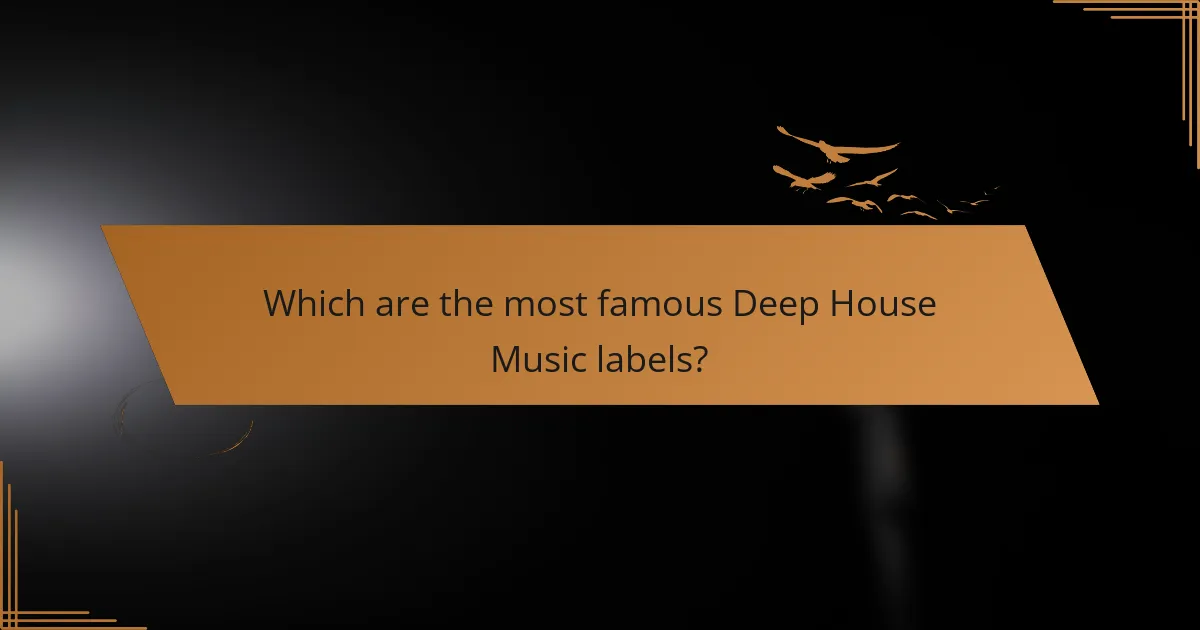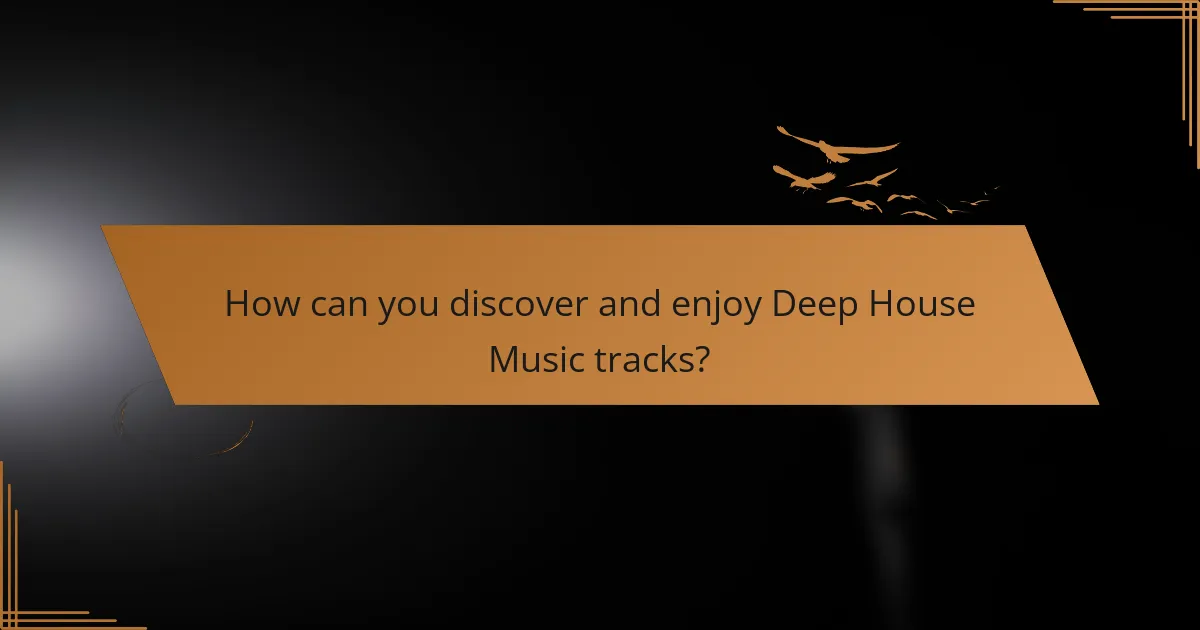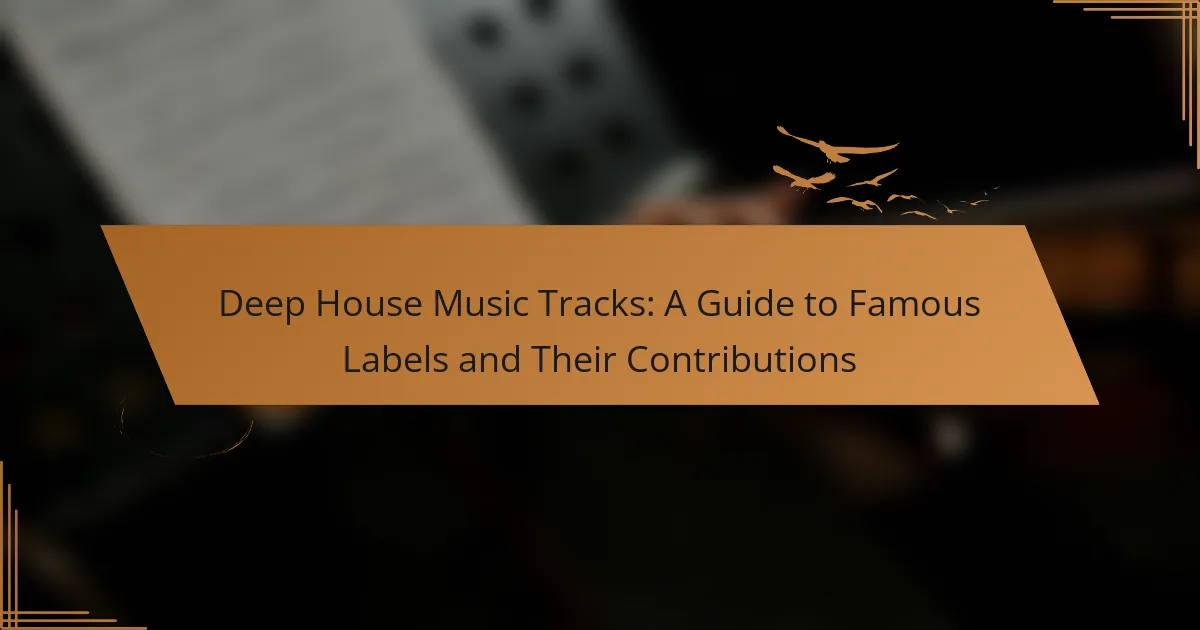Deep house music is a subgenre of house music known for its soulful and melodic elements, typically featuring a slower tempo of 120 to 125 beats per minute. The genre emerged in the 1980s, drawing influences from jazz, soul, and funk, with notable artists like Larry Heard and Kerri Chandler shaping its distinct sound. Key labels such as Defected Records, Strictly Rhythm, and Anjunadeep have played significant roles in promoting deep house music, releasing high-quality tracks and supporting emerging artists. This guide will provide insights into famous deep house labels, their contributions to the genre, and ways to discover and enjoy deep house music through streaming platforms and live events.

What is Deep House Music?
Deep house music is a subgenre of house music characterized by its soulful and melodic elements. It typically features a slower tempo, often ranging from 120 to 125 beats per minute. Deep house incorporates complex chords and lush harmonies, creating a smooth and immersive sound. Vocals in deep house can be soulful, jazzy, or spoken, adding to the genre’s emotional depth. The genre emerged in the 1980s, influenced by jazz, soul, and funk music. Notable artists include Larry Heard and Kerri Chandler, who helped shape its distinct sound. Deep house has gained popularity in clubs and festivals worldwide, showcasing its broad appeal.
How did Deep House Music originate?
Deep House Music originated in the 1980s as a subgenre of house music. It emerged from Chicago’s house scene, blending elements of jazz, soul, and funk. Pioneering artists like Larry Heard and Frankie Knuckles played key roles in its development. The genre is characterized by its use of complex chords and mellow basslines. In the late 1980s, Deep House began gaining popularity in clubs and dance venues. By the early 1990s, it had spread to Europe, influencing a new wave of producers. Labels like Strictly Rhythm and Defected Records contributed to its growth. Today, Deep House remains a prominent genre in electronic music.
What are the key influences behind Deep House Music?
Deep House Music is influenced by various genres and cultural elements. Key influences include Chicago house, which laid the foundation for the genre in the 1980s. Detroit techno also played a significant role, contributing its rhythmic complexity and synthesizer use. Jazz and soul music heavily influence deep house, providing melodic richness and emotional depth. The use of samples from these genres adds texture to deep house tracks. Additionally, African music rhythms have been integrated, enhancing the genre’s groove. The emergence of artists like Larry Heard and Kerri Chandler shaped its early sound. Labels such as Strictly Rhythm and Defected Records have further popularized deep house, showcasing influential artists. These influences collectively define deep house music’s unique sound and cultural significance.
How has Deep House evolved over the years?
Deep House has evolved significantly since its inception in the 1980s. Initially, it emerged from Chicago house music, characterized by its soulful vocals and jazzy elements. In the 1990s, Deep House gained popularity in Europe, particularly in the UK and Germany. This period saw the incorporation of more electronic sounds and a focus on atmospheric production.
By the 2000s, Deep House had diversified, with sub-genres emerging that included elements of techno and minimal house. The rise of digital music platforms further propelled its reach. In the 2010s, Deep House experienced a resurgence in mainstream popularity, influenced by artists like Disclosure and Duke Dumont. This led to a blend of commercial appeal and underground sounds.
Today, Deep House continues to evolve, incorporating various musical influences and styles. It remains a staple in clubs and festivals worldwide, with new artists constantly redefining its boundaries. The genre’s adaptability to changing musical trends has ensured its longevity in the electronic music landscape.
What are the defining characteristics of Deep House Music?
Deep House Music is characterized by its smooth, soulful sound and deep basslines. It typically features slower tempos, usually between 120 to 125 BPM. The genre often incorporates jazzy chords and ambient melodies. Vocals in Deep House are usually soft and melodic, enhancing its emotional depth. Additionally, it frequently utilizes electronic instruments and samples. The overall production quality tends to be polished and layered, creating a rich auditory experience. Deep House emerged in the 1980s, blending elements of house, jazz, and soul music. Its defining characteristics have contributed to its enduring popularity in dance music culture.
What are the typical elements of Deep House tracks?
Deep House tracks typically feature a combination of smooth, soulful vocals and deep basslines. They often incorporate jazzy chords and atmospheric synths to create a laid-back vibe. The tempo usually ranges from 120 to 125 BPM, providing a steady groove. Percussion elements are often subtle, using soft kicks and hi-hats for rhythm. Deep House also emphasizes melodic elements, often utilizing piano and guitar riffs. The genre frequently includes samples from various musical styles, enhancing its eclectic nature. These characteristics contribute to the genre’s signature sound, which is both relaxing and danceable.
How do tempo and rhythm play a role in Deep House Music?
Tempo and rhythm are fundamental elements in Deep House Music. The typical tempo ranges from 120 to 125 beats per minute. This moderate pace creates a relaxed yet danceable groove. Rhythm in Deep House often features syncopated basslines and intricate drum patterns. These rhythmic elements contribute to a laid-back, soulful vibe. The combination of steady tempo and complex rhythms enhances listener engagement. Tracks often utilize repetitive motifs to build a hypnotic effect. This structure encourages extended listening and dancing, which is central to the genre’s appeal.
What role do labels play in the Deep House Music scene?
Labels play a crucial role in the Deep House Music scene. They are responsible for discovering and promoting artists. Labels provide financial support for recording and distribution. They also help in marketing music to a broader audience. Many successful Deep House tracks are released through established labels. These labels often have a specific sound or aesthetic. This helps in shaping the genre’s overall identity. Additionally, labels facilitate collaborations between artists. This fosters creativity and innovation within the Deep House community.
How do labels influence the production of Deep House tracks?
Labels significantly influence the production of Deep House tracks by shaping the artistic direction and sound quality. They provide resources such as funding, studio access, and professional networks. Labels also connect artists with experienced producers and sound engineers. This collaboration enhances the overall production quality of the tracks. Additionally, labels often have established brand identities that guide the musical style of their artists. They promote specific trends within the Deep House genre, impacting the creative choices artists make. For instance, labels like Defected Records are known for their distinct sound, which influences the production techniques used by their signed artists. Ultimately, labels play a crucial role in defining the commercial viability and artistic integrity of Deep House music.
What is the significance of label branding in Deep House Music?
Label branding in Deep House Music is crucial for establishing identity and credibility. It helps artists gain recognition and build a fan base. A strong label can influence the commercial success of tracks. Labels often curate specific sounds, shaping the genre’s direction. For example, labels like Defected and Anjunadeep have defined the deep house aesthetic. They provide resources for promotion and distribution. This support enhances an artist’s visibility in a competitive market. Additionally, label branding fosters a community among artists and fans.

Which are the most famous Deep House Music labels?
The most famous Deep House music labels include Defected Records, Strictly Rhythm, and Anjunadeep. Defected Records, founded in 1999, is renowned for its high-quality house music releases. Strictly Rhythm has been influential since 1989, launching many successful artists in the genre. Anjunadeep, established in 2005, is known for its melodic and atmospheric deep house tracks. Other notable labels include Soulfuric Recordings and Nervous Records, both of which have significantly contributed to the deep house scene. These labels have established a reputation for quality and innovation in deep house music.
What are the top labels known for Deep House Music?
Defected Records, Anjunadeep, and Toolroom Records are among the top labels known for Deep House music. Defected Records has been influential since the late 1990s, focusing on quality house music. Anjunadeep, part of the Anjuna family, emphasizes melodic and progressive deep house sounds. Toolroom Records is known for its diverse catalog, featuring both established and emerging artists in the genre. Other notable labels include Spinnin’ Deep and Nervous Records, which contribute significantly to the deep house scene. These labels have established a reputation for releasing impactful tracks that shape the sound of deep house music.
What are the key releases from these labels?
It is not possible to provide a definitive answer to the question about key releases from these labels without specific label names or context. Each label in deep house music has multiple significant releases, but the lack of specified labels prevents an accurate response.
How do these labels contribute to the Deep House genre?
Labels contribute to the Deep House genre by promoting artists and their music. They provide financial support for production and marketing. Labels also curate and shape the sound of the genre through artist selection. They help establish trends and influence the direction of Deep House music. For example, influential labels like Defected and Anjunadeep have popularized specific sounds and styles. Their releases often feature high-quality production and innovative collaborations. This drives the growth and evolution of the genre. Additionally, labels organize events and showcases that further promote Deep House music.
What impact do these labels have on emerging artists?
Labels significantly impact emerging artists by providing resources, exposure, and industry connections. These entities often offer financial support for recording and marketing. They also facilitate access to established networks within the music industry. For instance, labels can arrange performances and collaborations, increasing visibility. Additionally, labels may provide guidance on artistic development and branding. This support can lead to greater audience reach and career longevity. Research indicates that artists signed to labels often experience higher streaming numbers and sales compared to independent artists. Thus, the influence of labels is crucial for the growth and success of emerging talents in the deep house music scene.
How do labels support new talent in the Deep House scene?
Labels support new talent in the Deep House scene by providing resources and platforms for exposure. They offer financial backing for production and marketing. This support helps artists create high-quality music. Labels also provide access to established networks and industry connections. These connections can lead to collaborations and performances. Furthermore, labels often promote new artists through social media and events. They may also distribute music across various streaming platforms. This enhances visibility and audience reach for emerging talent.
What opportunities do labels provide for artists?
Labels provide artists with financial support, marketing resources, and distribution channels. They often fund recording sessions and music production. This financial backing allows artists to focus on their craft. Labels also promote artists through marketing campaigns. They leverage their networks to gain media exposure. Additionally, labels facilitate distribution to streaming platforms and retail outlets. This access increases an artist’s reach to a wider audience. Furthermore, labels offer industry connections that can lead to collaborations and performance opportunities. These advantages can significantly enhance an artist’s career trajectory.

How can you discover and enjoy Deep House Music tracks?
To discover and enjoy Deep House Music tracks, utilize music streaming platforms like Spotify and SoundCloud. These platforms offer curated playlists specifically for Deep House genres. Explore labels known for Deep House, such as Defected Records and Anjunadeep, as they frequently release new tracks. Attend local events or festivals featuring Deep House artists to experience the music live. Follow Deep House music blogs and social media accounts for updates on new releases and artist interviews. Engaging with online communities dedicated to Deep House can enhance your understanding and enjoyment of the genre.
What are the best platforms to listen to Deep House Music?
The best platforms to listen to Deep House Music include Spotify, SoundCloud, and Apple Music. Spotify offers curated playlists and a vast library of Deep House tracks. SoundCloud is known for its user-uploaded content, featuring many independent artists. Apple Music provides exclusive releases and high-quality streaming options. These platforms are popular among Deep House enthusiasts for their extensive collections and user-friendly interfaces.
How do streaming services curate Deep House playlists?
Streaming services curate Deep House playlists using algorithms and user data. They analyze listening habits, genre trends, and user preferences. Algorithms identify popular tracks and emerging artists within the Deep House genre. User-generated playlists and ratings also influence playlist curation. Services like Spotify and Apple Music utilize editorial teams to refine selections. These teams often include music experts who understand the genre deeply. Data from user interactions helps to continuously update and personalize playlists. This process ensures that playlists remain relevant and engaging for listeners.
What role do DJ sets play in discovering new Deep House tracks?
DJ sets play a crucial role in discovering new Deep House tracks. They showcase emerging artists and fresh releases in a live setting. DJs often curate their sets to include unreleased or exclusive tracks. This exposure helps listeners identify new music trends and artists. Additionally, the energy and atmosphere of a live performance enhance the experience of discovering new sounds. Many listeners rely on DJ sets for recommendations and inspiration. The popularity of certain tracks can lead to increased interest and sales. Overall, DJ sets serve as a vital platform for introducing new Deep House music to audiences.
What tips can enhance your Deep House listening experience?
To enhance your Deep House listening experience, focus on high-quality audio equipment. Using headphones or speakers that deliver clear sound improves the overall experience. Additionally, create a comfortable listening environment. Dim lighting and minimal distractions can help immerse you in the music.
Exploring curated playlists or mixes can introduce you to new tracks and artists. Engaging with the community through forums or events can also deepen your appreciation. Lastly, consider the time of day; listening during quiet hours can allow for better focus on the intricate sounds typical of Deep House.
How can you create a perfect playlist for Deep House parties?
To create a perfect playlist for Deep House parties, start by selecting tracks that maintain a consistent vibe. Focus on songs with smooth basslines and melodic elements. Incorporate tracks from renowned Deep House labels like Defected Records and Anjunadeep. Include a mix of classic hits and contemporary releases for variety. Pay attention to the flow and energy levels of the tracks. Gradually build intensity throughout the playlist to keep the energy high. Ensure a balance between vocal and instrumental tracks for diversity. Lastly, consider the preferences of your audience to tailor the playlist effectively.
What should you look for in a Deep House track to appreciate its depth?
When appreciating the depth of a Deep House track, focus on its intricate layers and emotional resonance. Look for rich, soulful melodies that evoke feelings. Pay attention to the bassline, which should be deep and groovy, creating a solid foundation. Notice the use of atmospheric sounds, such as pads and effects, which enhance the track’s ambiance. Evaluate the vocal elements; they often add a personal touch and depth to the music. Analyze the production quality, as polished tracks tend to have a more profound impact. Lastly, consider the track’s structure; a well-crafted arrangement can lead to a captivating journey through sound.
Deep house music is a subgenre of house music known for its soulful melodies, slower tempos, and emotional depth, emerging in the 1980s from Chicago’s vibrant music scene. This article provides a comprehensive overview of deep house music tracks, highlighting the significant contributions of renowned labels such as Defected Records and Anjunadeep, which have shaped the genre’s sound and popularity. Key influences, defining characteristics, and the evolution of deep house music are discussed, along with insights into how labels support emerging artists and the role of streaming platforms in discovering new tracks. Additionally, tips for enhancing the deep house listening experience and creating effective playlists for parties are included.
